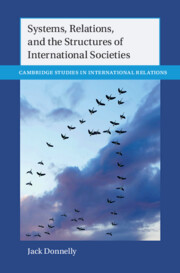Book contents
- Systems, Relations, and the Structures of International Societies
- Cambridge Studies in International Relations
- Systems, Relations, and the Structures of International Societies
- Copyright page
- Contents
- Figures
- Tables
- Acknowledgments
- Part I Systems, Relations, Levels, and Explanations
- Part II Waltzian Structural Theory
- Part III Systems, Relations, and Processes
- Part III (A) Differentiation and Continuous (Trans)Formation
- 10 Relations, Processes, and Systems
- 11 Multiple Dimensions of Differentiation in Assembled International Systems
- 12 Continuous (Trans)formation
- 13 Life Sciences and Social Sciences
- Part III (B) Four Excursions in Relational/Systemic IR
- References
- Index
- Cambridge Studies in International Relations
13 - Life Sciences and Social Sciences
Studying Co-evolving Complex Adaptive Systems
from Part III (A) - Differentiation and Continuous (Trans)Formation
Published online by Cambridge University Press: 19 October 2023
- Systems, Relations, and the Structures of International Societies
- Cambridge Studies in International Relations
- Systems, Relations, and the Structures of International Societies
- Copyright page
- Contents
- Figures
- Tables
- Acknowledgments
- Part I Systems, Relations, Levels, and Explanations
- Part II Waltzian Structural Theory
- Part III Systems, Relations, and Processes
- Part III (A) Differentiation and Continuous (Trans)Formation
- 10 Relations, Processes, and Systems
- 11 Multiple Dimensions of Differentiation in Assembled International Systems
- 12 Continuous (Trans)formation
- 13 Life Sciences and Social Sciences
- Part III (B) Four Excursions in Relational/Systemic IR
- References
- Index
- Cambridge Studies in International Relations
Summary
Mainstream social science, when it looks for parallels with the natural sciences, tends to look to classical Physics, which stresses laws, causes, and theories. I argue that we should look instead to Biology, which explains principally with processes, mechanisms, and models. Here I look briefly at Evolutionary Biology and Developmental Biology, where reductionist gene-centric explanatory programs have failed – decisively and spectacularly (and relatively recently). Evolution involves not just genes (let alone selfish genes) but multilevel processes of modular tinkering, very much like what I have called continuous (trans)formation, including processes of co-evolution that are strikingly analogous to what we see in the social world. Similarly, gene expression, rather than a largely mechanical DNA-directed bottom-up process, is as much a matter of manipulating and transforming genetic material as it is processing the information that it contains. Gene expression can only be properly performed within multiple, complexly intertwined, self-organizing regulatory networks. More broadly, I argue that Systems Biology, which is on the cutting edge of twenty-first-century Biology, provides an attractive model for relational/systemic social sciences.
Keywords
- Type
- Chapter
- Information
- Publisher: Cambridge University PressPrint publication year: 2023

